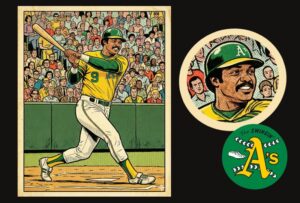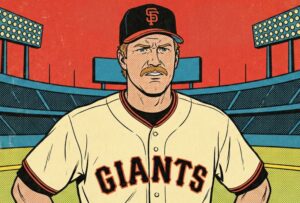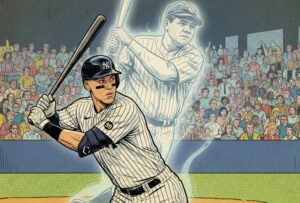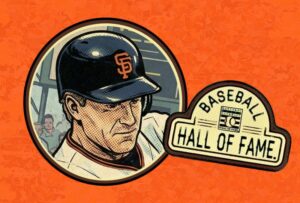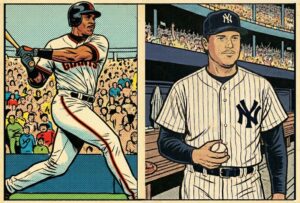Ever the team player, Joe Mauer announced his retirement last week, just in time for the Minnesota Twins to make plans for the upcoming winter meetings. The team will need to fill his big shoes in the middle of their lineup after #7 spent 15 seasons with his hometown team.
I’ve written previously about Mauer and Buster Posey and the Hall of Fame, but some things have changed in the nearly two years since that article. Most of that change applies to Posey, who is four years younger than Mauer and still adding to his résumé.
Mauer leaves a great legacy in Minnesota after a remarkable career, one of the best careers by a catcher in recent memory. After a five-year wait, his name will be on the Hall of Fame ballot in 2024. The five-year wait is a smart part of the Hall rules, allowing for time to reflect on the career of a player. Once the baseball writers have a chance at Mauer they will have had plenty of time to ruminate on his plaque worthiness. I think Mauer will get elected in year one, and here’s why.
#1. The Batting Titles
Few players in recent years will benefit more from the five-year wait than Mauer. The five years helps erase the weaknesses of a player and accentuates his positives. By 2024, voters will look at Mauer’s batting record and see three bold numbers in the batting average column. No other catcher in history has won as many as three batting titles, Mauer stands alone.
The only other catcher to win two batting crowns was Ernie Lombardi, a Hall of Famer. Much of Lombardi’s case for the Hall rested on that accomplishment. Lombardi won his titles prior to the end of World War II, Mauer accomplished it in modern times. He won the titles at the age of 23, 25 and 26, when he was still crouching behind the plate. Winning a batting title while handling the demands of catching is a tremendous feat that Mauer did three times. This is Joe’s best argument for a first ballot induction.
#2. The Gold Glove Awards
Mauer caught regularly for the first ten years of his career. During that stretch he won three Gold Glove Awards and was an excellent backstop. His manager, pitching staff and coaches complimented him on his handling of a game behind the mask. He’s one of only 11 catchers to win as many as three Gold Gloves.
There might be some voters who will debate Mauer’s move to first base for the final five years of his career. Mauer caught only 921 games and only had five seasons where he caught as many as 100 games. But Mauer did not move to first base because he was a bad defender, he moved after suffering numerous concussions and to preserve his knees.
The games caught argument will be the most damning one you’ll hear from Mauer detractors. No Hall of Fame catcher caught as few games as Mauer’s 921, other HOF catchers who switched positions to extend their careers did so later in their careers and still caught well over 1,000 games. But I think Mauer’s defensive ability and his batting laurels will squelch any doubts that are caused by his low catching output.
But another Joe Catcher is a good comparison that works out in Mauer’s favor. Joe Torre began his career as a catcher with the Braves in the 1960s. Like Mauer, Torre spent ten years as a catcher, like Torre he switched to a less demanding position, third base and eventually first. Torre won an MVP too, but he won his award as a third baseman. Torre was a great hitter, he won a batting title and nearly hit .300 for his career. But Torre’s batting title came as a third baseman and he never finished higher than fifth in MVP voting as a catcher because he wasn’t a very good catcher. Torre was moved from catcher because he was never that great behind the plate. Mauer won’t be looked at that way.
As an addendum, Mauer performed very well in league awards too. He won the AL Most Valuable Player Award in 2009 when he had one of the best seasons ever by a catcher. He finished fourth the previous year and was in the top ten two more times. His MVP award points rank him solidly in the middle among catchers. Hall of Fame catchers who never won the MVP include Carlton Fisk, Lombardi, and Bill Dickey. Voters like big years, and Mauer had one.
#3. Few Weaknesses as a Player
Among the great catchers in history, Mauer is one of the most fundamentally sound and he had few weaknesses to his game. Let’s start first with his obvious weakness: he was a pretty slow runner. And that’s it. But Mauer compensated for that by being a very smart baserunner. He was successful on 73 percent of his steal attempts, and he advanced on singles from first to third at a rate above league average.
Mauer’s throwing arm was strong and accurate, his defense was solid. He hit for average, could hit the ball to all fields, could hit for power, (though he chose to focus on his on-base percentage and batting average, not sacrificing those for added home runs). Mauer knew the strike zone, in each of his three batting title years he walked more than he struck out.
#4. One-Team Player
Nothing looks sweeter on the back of a bubble gum card than one team name all the way down the left column of your career record. Mauer spent all 15 years with the Twins. He became the face of the franchise, the team leader and the focal point of the offense. Voters like one-team players, it seems to elevate the player to a new level. Like Tony Gwynn, Robin Yount, and George Brett, Mauer has a deep connection to one franchise and one city.
#5. Hometown Hero
Speaking of cities, Mauer was born in St. Paul where he was a multi-sport star in high school. The Twins made him the #1 overall pick in the 2001 MLB Draft. Three years later the hometown kid was in the Twins lineup and hit .308, which is basically his career average.
Mauer would become the fourth St. Paul native to be elected to the Hall of Fame, joining Dave Winfield, Paul Molitor, and Jack Morris, all of whom spent brief stretches with the Twins. Mauer spent his entire career only a few miles from where he grew up. He’s beloved in Minneapolis/St. Paul and the entire state.
#6. The Analytics
Whichever analytical method you want to use to rate catchers, Mauer ranks among the very best. You can use Wins Above Replacement (WAR) and Mauer is eighth all-time for his career. If you want peak performance, Mauer ranks fifth in WAR7 (his bests even seasons). An average of the two (called JAWS) puts Mauer seventh, behind Johnny Bench, Gary Carter, Pudge Rodriguez, Pudge Fisk, Piazza, and Yogi Berra. That’s the catching elite. Mauer rates ahead of the 1930s Hall of Famers Cochrane, Hartnett, Lombardi and Dickey. He ranks ahead of Roy Campanella, who got a late start because of the color barrier.
Want to use Win Shares? (Win Shares is the analytic method preferred by Bill James, the father of sabermetric analysis). Mauer ranks 11th in career Win Shares and seventh in career Offensive Win Shares. If we rank catchers based on Win Shares in their seven best seasons, Mauer ranks sixth behind Bench, Piazza, Berra, Carter, and Torre.
#7. The .300 Career Batting Average
Does anyone pay attention to batting average anymore? Advanced statistical methods have obscured the importance of the stat, and most experts pay little attention to batting average, unless it’s abnormally low or unusually high. Mauer hit .328 in his years time as a catcher, and he batted .306 for his career. Right or wrong, there are some baseball writers who still like batting average. Had he batted .298, you wouldn’t hear it much, but sure enough when Mauer’s name is put on the HOF ballot, you’ll hear .306 a lot.
Among players who caught at least 900 games, Mauer’s career batting average ranks fifth. Three of the men in front of him are in the Hall of Fame:
1. Mickey Cochrane … .320
2. Bill Dickey … .313
3. Mike Piazza … .308
4. Spud Davis … .308
5. Joe Mauer … 306
6. Ernie Lombardi … .306
Davis only got to the plate about 4,700 times, by far the lowest number among the batting average leaders for catchers. He won a batting title, but he’s not considered a great player.
Do you think Joe Mauer will be elected to the Hall of Fame? On the first ballot? If not, why? Let me know in the comments section.



